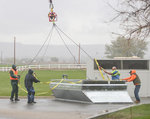Clear, 39° F
The thumping of the helicopter blades could be heard from just about anywhere in Powell Friday, as a CH-47D “Chinook” hovered around Northwest College. Residents gathered around the …
This item is available in full to subscribers.
The Powell Tribune has expanded its online content. To continue reading, you will need to either log in to your subscriber account, or purchase a subscription.
If you are a current print subscriber, you can set up a free web account by clicking here.
If you already have a web account, but need to reset it, you can do so by clicking here.
If you would like to purchase a subscription click here.
Please log in to continue |
|


The thumping of the helicopter blades could be heard from just about anywhere in Powell Friday, as a CH-47D “Chinook” hovered around Northwest College. Residents gathered around the campus to watch the helicopter lifting three-ton air conditioning units onto the roof of the college’s Orendorff Building.
To characterize the risk involved with the operation, Dave Plute, Northwest College plant manager, refers to a saying among Navy helicopter mechanics. They describe a helicopter as a million parts flying in close formation.
A lot of other moving parts had to work together properly for a successful operation, and flying the helicopters was just one task at hand.
The college was replacing two rooftop air conditioning units that were over 30 years old. The old ones had to be lifted off the roof and set on the ground before the new ones could be hoisted back onto the roof. Both the old and new units had a “curb” to move as well. These are kind of like adapters that fit the units into the hole on the roof.
Using cranes would have been a lot more expensive, as they would need to remove trees and break concrete to get one into position.
The operation, which had been in the planning stages for months, was originally slated to go for Tuesday. One of the moving parts that had to come together was the weather, and it wasn’t cooperating. While a window opened up in Powell on Tuesday afternoon, low visibility and clouds kept Billings Flying Service from getting the chopper down here. Friday’s weather wasn’t much better, but it was good enough for the trip from Billings.
“It could have been worse,” Plute said.
There were more than a dozen people involved in the operation. Some were on the ground, some were on the roof, and the rest were in the chopper.
The primary concern was safety. Helicopters can’t make the same precise movements a crane can, and there’s always the chance something can go wrong when you have three-ton machines swinging through the air. It was impressive to see how steady the units were as they lifted up and set back down again.
“The pilot was sure holding that puppy steady,” Plute said.
Some members of the ground crew kept people out of the emergency landing zones, which were designated just in case the pilots had to put the bird down quick. A few excited children, eager to get as close as they could to the helicopters, ran across the fields, and they had to be told to stay behind the barriers.
Fortunately, there were no emergencies, and the operation went off about as smoothly as one can expect on a cold, rainy day.
“We were lucky the weather opened up enough that we could get everything done,” Plute said.
The new units are much more efficient and will save the college money over time.
“We should see an incremental decrease in our utility costs,” Plute said.